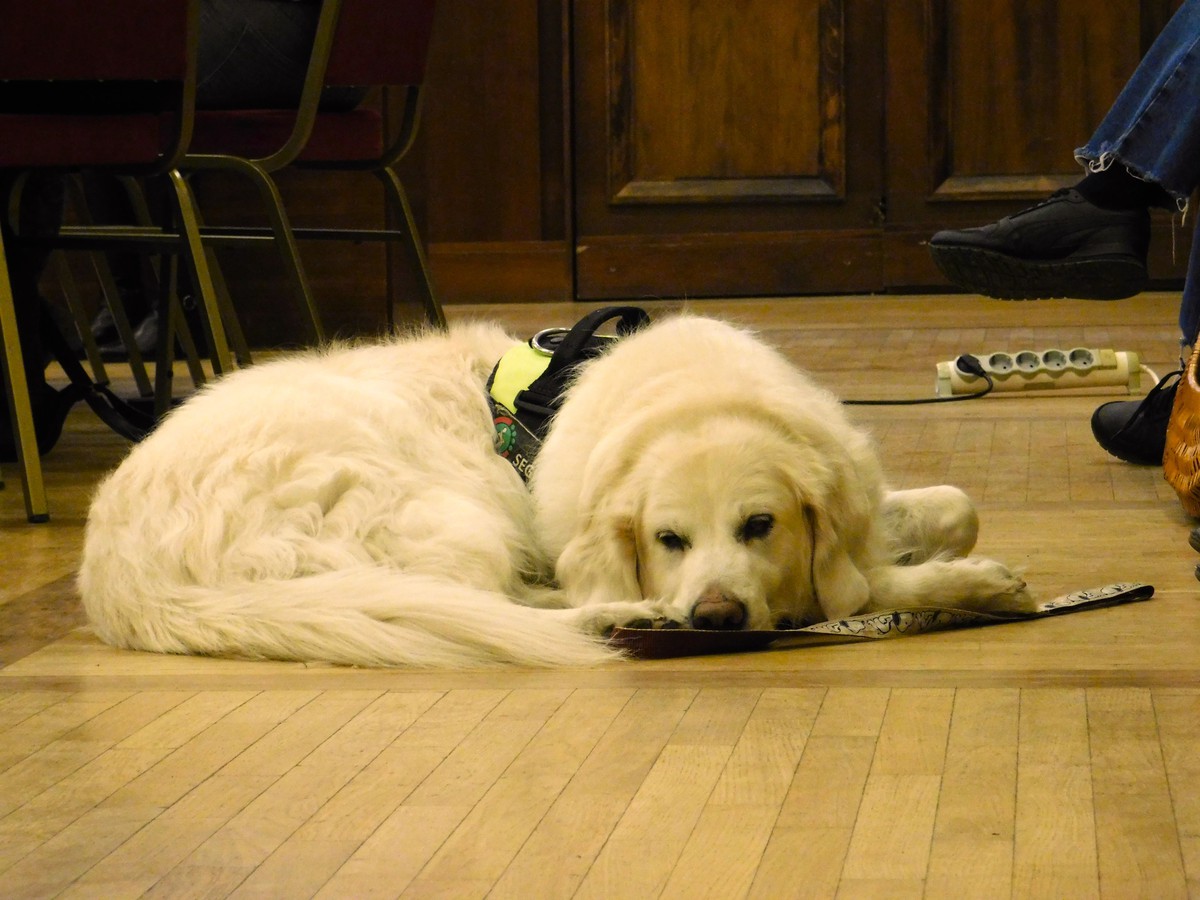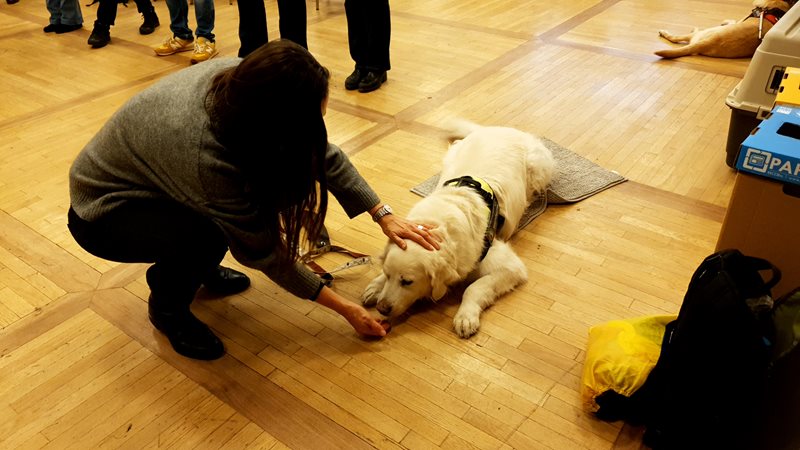Assistance dogs at the university! – report from the research week

On the occasion of the Research Week, NEO Hungarian Assistance Dog Association and Corvinus Science Shop organized a joint event, during which they provided an opportunity for assistance dog workshops. For the seventeenth time, the Science Shop will enable people with disabilities to work together and get to know assistance dogs better, both theoretically and practically.
After a presentation to encourage a change of mindset, the members of the Association invited the participants to an interactive workshop. They even introduced their assistance dogs to the audience and involved them in exercises, making the experience unique and authentic.
Corvinus Science Shop
The Corvinus Science Shop is an organisation of the university that strengthens the dialogue between science and society and provides a meeting point where the local and university audience can ask questions and find answers. Their main objective is to answer questions from civil society organisations, social enterprises, non-profit organisations, informal communities and active citizens through university subjects and research, involving academics, researchers and students. The workshop will foster collaboration and provide a space for joint work in the hope that both parties will develop and learn as much as possible from each other in the process. Their motto reflects their principles: ‘accessibility, access, inclusion’.
NEO Hungarian Helping Dog Association
NEO Hungarian Helping Dogs Association is an advocacy organisation that trains and employs helping dogs and promotes social awareness. The association was founded in 2011 by a group of hearing-, sight- and mobility-impaired assistance dog owners, and now has 50 active volunteer members. Most of them are affected by some kind of physical or mental problem and are also assistance dog owners. Their main goal is to advocate for people with disabilities and to promote their social inclusion through specially trained assistance dogs. The lecture at the university was also aimed at changing attitudes, raising awareness and shaping attitudes.
Meet the assistance dogs!
Their profile includes several types of assistance dogs, including hearing-impaired assistance (voice) dogs, mobility-impaired assistance dogs, personal assistance (e.g. visually impaired assistance, autism assistance) dogs or seizure dogs (e.g. for people with diabetes or epilepsy), and they also have a therapy dog for mental health. The association trains its new puppies on an ongoing basis, as they can only become their owner’s official assistance dog with a qualification and a central licence.

While most of them can only work with one patient, therapy dogs can make life easier for several patients by providing companionship, safety and alternative medicine. It is important to note, however, that although these animals are meant to help and sometimes protect human life, even today they often run into the problem of being unaccepted by their environment and society. Despite the fact that legislation protects the rights of puppies, such as the right to accompany their owners wherever they go, even into public spaces, many people are opposed to and frown upon the presence of dogs. For example, instead of trying to regulate those who need assistance dogs, it would be worthwhile to consider how much they need the help of their dogs and to recognise that they need support to actively participate in society.
Learning about the benefits of assistance dogs and their owners – our fellow humans with disabilities – can help change attitudes. During the presentation, many arguments were put forward, all of which support the positive impact of assistance dogs. For example, they provide mental, physical and social well-being. Social wellbeing could also mean, for example, that more people in everyday life try to approach a person with a disability because of their dog, thus helping them to overcome difficulties. In addition, dogs are the best carers, helping to relieve everyday stress, their companionship produces the happy hormone and their loyalty means they can always be counted on.
Living and working with people with disabilities
During the presentation, the magic word “mindset shift” was mentioned several times, but what does it really mean? The Association’s members encourage us to refer to this phenomenon as attitude or mindset change rather than sensitisation. ELTE’s Bárczi Gusztáv Faculty of Special Education has produced a complete glossary to help us express ourselves correctly on such a sensitive topic. As an example, it is worth avoiding the term wheelchair, as it can make the wheelchair user feel that their mobility is completely limited and that they need the help of others, while they are able to operate the wheelchair on their own. The Association’s President, Richárd Mányik, also shared his experience in this regard, and for him the term wheelchair also gives more freedom than a wheelchair. Ultimately, it is all a matter of perspective.
Discussion with the members of the association
During the interactive workshop, we got to know other people with disabilities as well as Richárd Mányik. Dr. Eszter Loványi and Enikő Gál used group tasks to show the difficulties they have to cope with and how to make their situation livable. The speakers also tried to answer questions such as what sports a wheelchair user can play, how important is it for a hearing impaired person to be able to read lips, or whether a visually impaired person can see in their dreams? These and other interesting questions will be answered by the panelists.

Efi Bekiarisz
photo: Tóth Valter